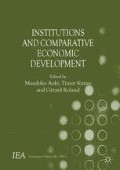Abstract
An influential literature sees the roots of sustained economic growth in Europe’s unique institutional framework. The events and the factors contributing to the emergence of these institutions, however, remain a topic of scholarly disagreement. Authors have sought the origins of these institutions in factors ranging from geography to culture. In this chapter, I propose a conceptual framework to better understand the emergence of Europe’s medieval institutional framework (which included parliaments, city states, juries and impersonal exchange among other institutions) through comparison with the institutional equilibrium in the Islamic Middle East before the rise of the Ottoman Empire (that is, I center my attention on the period between the 9th and 15th centuries CE).1
Access this chapter
Tax calculation will be finalised at checkout
Purchases are for personal use only
Preview
Unable to display preview. Download preview PDF.
References
Berman, H. (1983) Law and Revolution: the Formation of the Western Legal Tradition (Cambridge, MA: Harvard University Press).
Blaydes, L. and E. Chaney (2011) ‘The Feudal Revolution and Europe’s Rise: Institutional Divergence in the Christian and Muslim Worlds before 1500 CE’, mimeo.
Bloch, M. (1961) Feudal Society: the Growth of Ties of Dependence (Chicago: University of Chicago Press).
Chaney, E. (2011) ‘Revolt on the Nile: Economic Shocks, Religion and Political Power’, mimeo.
Cook, M. A. (1976) ‘Introduction’, in V. J. Parry, H. Inalcik, A. N. Kurat and J. S. Bromley (eds), A History of the Ottoman Empire to 1730 (Cambridge: Cambridge University Press).
Crone, P. (1999) ‘The Early Islamic World’, in K. Raaflaub and N. Rosenstein (eds), War and Society in the Ancient and Medieval Worlds (Cambridge, MA: Harvard University Press).
Crone, P. (2005) Medieval Islamic Political Thought (Edinburgh: Edinburgh University Press).
Drake, H. A. (2007) ‘The Church, Society and Political Power’, in A. Casiday and F. W. Norris (eds), Constantine to c. 600 (Cambridge: Cambridge University Press).
Graves, M. (2001) The Parliaments of Early Modern Europe (New York: Pearson Education).
Greif, A. (2006) Institutions and the Path to the Modern Economy: Lessons from Medieval Trade (New York: Cambridge University Press).
Hintze, O. (1975) The Historical Essays of Otto Hintze, edited by F. Gilbert (New York: Oxford University Press).
Kuran, T. (2011) The Long Divergence: How Islamic Law Held Back the Middle East (Princeton: Princeton University Press).
Lapidus, I. (1984) Muslim Cities in the Later Middle Ages (New York: Cambridge University Press).
Mokyr, J. (2002) The Gifts of Athena: Historical Origins of the Knowledge Economy (Princeton: Princeton University Press).
Nielsen, J. (1985) Secular Justice in an Islamic State: Mazalim under the Bahri Mamluks (Leiden: Nederlands Instituut voor het Nabije Oosten).
Pipes, D. (1981) Slave Soldiers and Islam: The Genesis of a Military System (New Haven: Yale University Press).
Pirenne, H. (1956[1925]) Medieval Cities: Their Origins and the Revival of Trade (Princeton: Princeton University Press).
Pirenne, H. (1956[1939]) Mohammed and Charlemagne (Totowa: Barnes & Noble Books).
Rapp, C. (2005) Holy Bishops in Late Antiquity (Berkeley: University of California Press).
Tellenbach, G. (1993) The Church in Western Europe from the Tenth to the Early Twelfth Century (New York: Cambridge University Press).
Tierney, B. (1973) The Ecclesiastical Setting for Medieval Constitutionalism, in T. Bisson (ed.), Medieval Representative Institutions: 129–138 (Hinsdale: The Dryden Press).
Van Zanden, J. (n.d.) ‘Economic Growth in a Period of Political Fragmentation’, mimeo.
Van Zanden, J., E. Buringh and M. Bosker (2011) ‘The Rise and Decline of European Parliaments, 1188–1789’, Economic History Review, forthcoming. Available at: doi: 10.1111/j.1468-0289.2011.00612.x.
Author information
Authors and Affiliations
Editor information
Editors and Affiliations
Copyright information
© 2012 International Economic Association
About this chapter
Cite this chapter
Chaney, E. (2012). Separation of Powers and the Medieval Roots of Institutional Divergence between Europe and the Islamic Middle East. In: Aoki, M., Kuran, T., Roland, G. (eds) Institutions and Comparative Economic Development. International Economic Association Series. Palgrave Macmillan, London. https://doi.org/10.1057/9781137034014_7
Download citation
DOI: https://doi.org/10.1057/9781137034014_7
Publisher Name: Palgrave Macmillan, London
Print ISBN: 978-1-137-03403-8
Online ISBN: 978-1-137-03401-4
eBook Packages: Palgrave Economics & Finance CollectionEconomics and Finance (R0)

